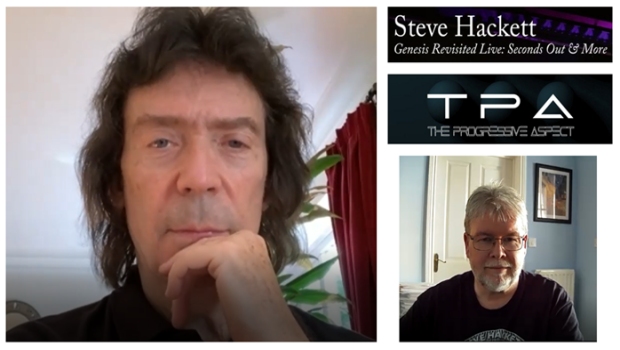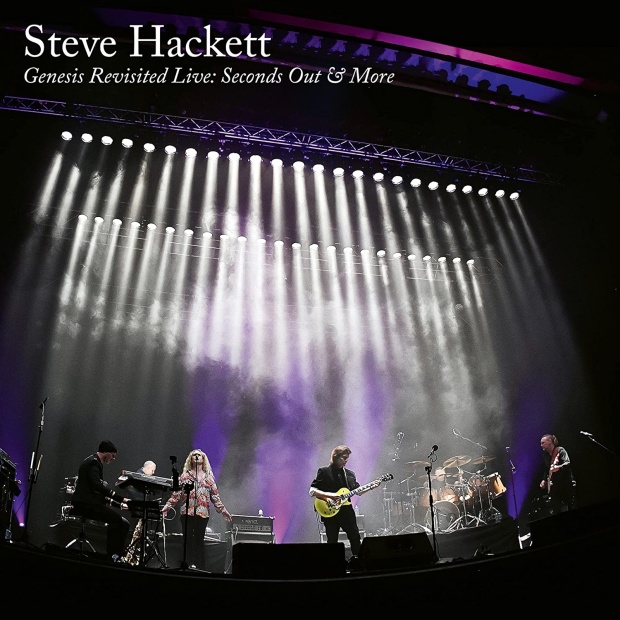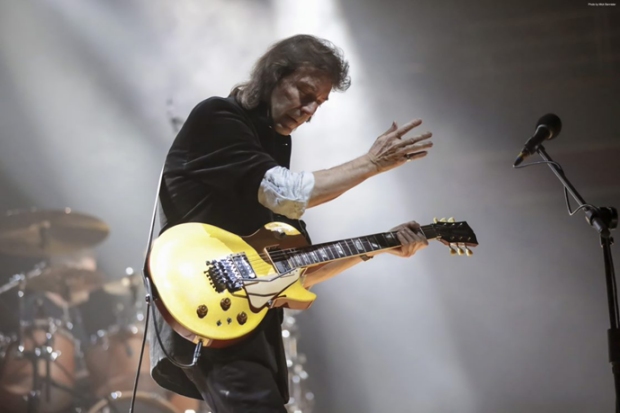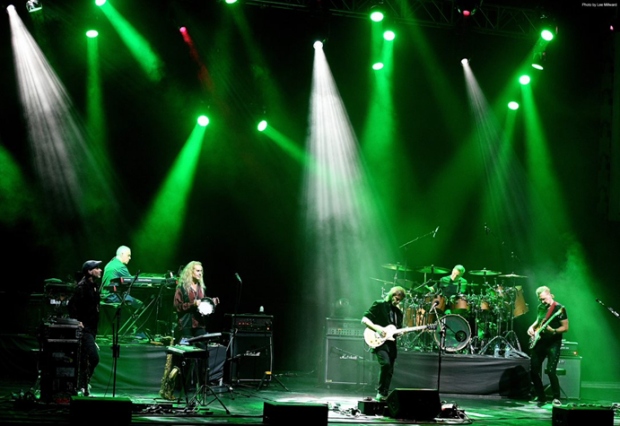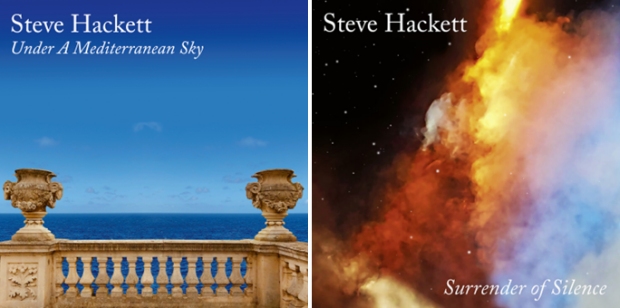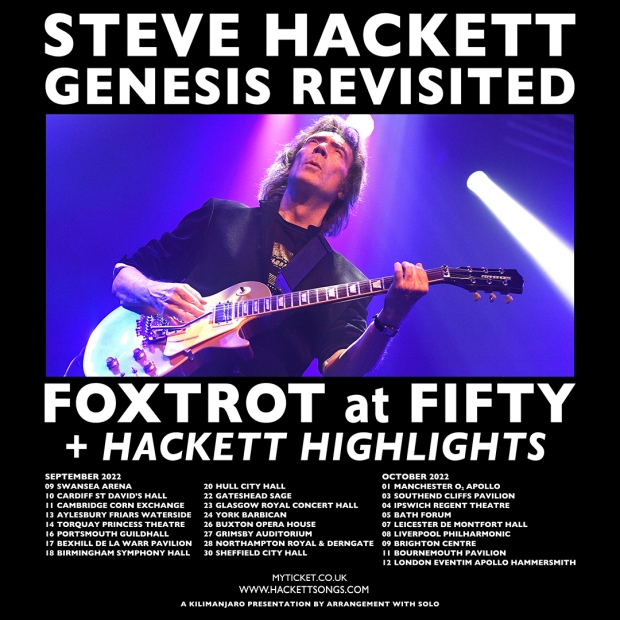TPA’s David Edwards recently had the great pleasure to be able to talk to one of his prog rock heroes, Steve Hackett, during one of those rare moments over recent months when he and his wife, Jo, have had some spare time. Discussions turned to the forthcoming release of a live album of last year’s Seconds Out and More tour on 2nd September and look forward to the Foxtrot at 50 UK tour through September and October, but Steve was also able to reminisce about the past, his fellow musicians and the creative process behind his music…
So, Steve, it’s been a very busy year on the road for you and the band. You’ve had a long tour of the USA. You went down to Australia and New Zealand and then on to Japan, and then some dates in Europe. How’s it been for you?
Well, it’s been a phenomenally busy year because we had so many postponed shows. So, it’s all concertinaed into this time frame that basically started last Autumn. We’ve kind of been touring incessantly ever since in fulfilling these things. We were halfway through an American tour, and then the world closed down. We got the last flight back from Philadelphia, and we were two weeks into a month-long tour at that point. But now of course, we’ve done so many more continents since then. Our feet haven’t really touched the ground.
It’s been an extraordinary time and Seconds Out has been the main thrust of it. For some unfulfilled shows, people had subscribed to seeing the whole of Selling England by the Pound as well, so they saw us do those two albums back-to-back, which worked because there’s some commonality between them. But that meant I didn’t really have time for performing much solo stuff. But for the shows where people were expecting to see Seconds Out, I did maybe about 40-minutes of solo stuff, followed by the grand slam that was Seconds Out – the whole thing! I think the original album came out something like 90-minutes, and then things would get a little bit longer with me and the chaps with some solos getting a little extended. But you expect that from guitarists, don’t you? We never know when to stop!
The new Seconds Out and More live recording of that tour is coming out at the start of September recorded at the Manchester Apollo, I gather. Do you have any particular memories of that evening or the tour?
This is the funny thing. We filmed Manchester on the same night that Genesis were in town as well. Same town, two bands doing similar music. Obviously, mine was more ’70s orientated, whereas theirs was more ’80s. I have to say, it sounds quite wonderful. But at the time, when I was on stage, I remember thinking, ‘yeah, my old band is up the road doing this.’ And you know, you feel like the competition’s on, and I don’t think of myself as a competitive character. It just so happened that they were in town doing their stuff and we were there as well doing ours. I remember talking to John Giddings, our promoter, who works for us and them, and he mentioned that the first thing he ever did when he was social secretary at Exeter University was to book Genesis there for about 15 quid to do Foxtrot. It reminded me of that. And, of course, we’re going to do that album later in the year.
But looking back on that tour, it’s been a very busy time – phenomenally busy. Not so busy in the studio at the moment, because playing so many live gigs has meant that I haven’t been able to do new recording other than live work. So, yes, we’ve got a live release of Seconds Out, which itself was a live album. And I just have to say that I think it sounds really good. I’m even going to say I think it sounds better than the original album, because the production sounds better. Production techniques have moved on from those days when we did that. People will be able to judge for themselves and say what they think, but it’s a bit like shadow boxing, isn’t it? Competing with your own past!
Many people, including myself, always thought in the original Seconds Out mix you were a bit low down – something the remastered version rectified to a large extent. I’d imagine on this release you’ll rightly be up front and centre?
I am indeed. I am indeed audible. On this recording it’s been arranged! Having said that, on tracks such as The Carpet Crawlers, I deliberately did a continuous guitar part that was meant to be heard very quietly, but all the notes are heard on it. It was a counterpoint to the lead vocal melody. In true Genesis fashion, you’ve got a very busy keyboard part, a very busy guitar part and a very busy vocal part. But I don’t think on that track that they actually get in the way of each other. You’ve got a lot of musical information going on. And I’ve noticed that people get very moved by that particular track. I do get people coming up to me saying that track makes them cry. I think Firth of Fifth is the one that my mother says always gets to her. She always felt that was my voice. And it’s still a lovely tune – a lovely melody. Genesis was full of great melodies. I was a fan of all the other writers in the band. They did come up with some phenomenal stuff.
Regarding the Manchester show – at the time I was doing it, I felt that it was a bit under-par, you know? The sense of pressure of having my old band up the road playing at the same time. I couldn’t switch off from that thought. But listening back to it now, I think it sounds really great and the band were so professional in supporting me. I’m really thrilled with the way it sounds. I’m being honest in saying it’s probably the best live album we’ve ever done.
This is the seventh Genesis Revisited live album you’ve done, since the Hammersmith show in 2013. Yet it’s great to hear that you feel the band’s performance was once again top notch on this recording.
Yes, I think it was. I mean nerves played their part on the night, but when you’re listening back, it’s a band that are on phenomenal form. It sounds great! So, I’m really thrilled with that. It certainly sounds amazing. And not just the Genesis stuff. The solo stuff sounds brilliant too. They’re a wonderful band. They bring everything to life.
Roger King, Nad Sylvan and Rob Townsend have been with you for quite a few years now on stage, with Jonas Reingold joining you for the last few tours, and Craig Blundell joining prior to the lockdown. They all seem to really gel together and feel a real unit now.
Jonas and Craig are a phenomenal rhythm section. There’s no doubt. I mean, if you wander into any soundcheck, and you hear them tearing into anything they might be doing, whether it’s one of ours or whether they’re having a jazz odyssey, you know, you’re just hearing virtuosity on top of virtuosity. They’re extraordinary. Jonas can play Bach on a bass and that has to be believed. And he plays phenomenally fast. It is extraordinary. And, of course, Craig is an absolute destroyer of other drummer’s careers. It’s just fabulous.
As you’ve said, live work has been the focus for the last year, but during lockdown you were able to record and release two albums – the more acoustic Under A Mediterranean Sky and the band-led Surrender of Silence. Have you been pleased with the response from fans of those two albums, whilst the Genesis Revisited touring has continued?
Yeah. I was thrilled at the response to everything. We first put together the Under A Mediterranean Sky album – acoustic, kind of classical, kind of soundtrack sounding. We had a couple of weeks off, then we got on with Surrender of Silence, which had again lots of classical influence, lots of soundtrack themes, lots of orchestra sounds. We used samples, we used tracking, we used everything – everything bar having a real orchestra on it, but it does sound like the Berlin Philharmonic on a good night!
Roger did a fabulous job with the production and with the arrangements. You know, we negotiate every note together between us. It has to be right. I can’t just hand it over to anybody. I’ve got to be there for it all. What I find is when we do the live stuff, I’ll just let him get on with it and just make a few comments, because believe me, mixing live albums is not a spectator sport. You know you’ve got to let the guy get on with working the knobs. But doing studio stuff, that’s very different. Studio work is something where I care about every note, so that has to be right. And again, I think he did a wonderful job.
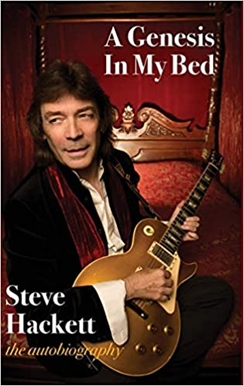 So, we had those two studio albums over lockdown. We released a live recording of the Selling England by the Pound tour. But also, largely at my wife’s behest, I finished the autobiography – A Genesis in My Bed – as well. And it meant that I was able to do lots of rewriting and to really concentrate on that. She recently reminded me that we also did about sixty lockdown videos to try and stay in touch with people – either playing to camera or playing tracks that were people’s favourites or forthcoming previews of things and saying, ‘Well listen to this, you know. I’m proud of this bit, I’m proud of that. Here’s some of your favourites. Write in to us. Tell us what you’d like me to talk about and play.’
So, we had those two studio albums over lockdown. We released a live recording of the Selling England by the Pound tour. But also, largely at my wife’s behest, I finished the autobiography – A Genesis in My Bed – as well. And it meant that I was able to do lots of rewriting and to really concentrate on that. She recently reminded me that we also did about sixty lockdown videos to try and stay in touch with people – either playing to camera or playing tracks that were people’s favourites or forthcoming previews of things and saying, ‘Well listen to this, you know. I’m proud of this bit, I’m proud of that. Here’s some of your favourites. Write in to us. Tell us what you’d like me to talk about and play.’
So, there was as much interaction as you could get with our audience. They were all in their personal prisons, ‘the people’s prison’ as one of my pals puts it! And to be honest, it was a very productive time and I had time to be productive too. I didn’t feel claustrophobic. I just felt that it was an inner journey. To put aside the idea of being a performing seal, in the circus. There was no circus, there was no orchestra, there was no group – you couldn’t do it. You had to make it work. People had to phone in their parts, you know. People worked in their own little sort of industrial cells and sent in some really great stuff. Wonderful stuff from Nick D’Virgilio from the States amongst many others. So, the world was kind of talking to itself, but largely via satellite and technology. We’ve got some wonderful technology at the moment – and most of it worked!
And of course, you’re gearing up for a new 25-date UK tour from September, with its centrepiece being the wonderful Foxtrot at 50. My wife and I are really looking forward to you coming back to the Sage at Gateshead, with its great acoustics, and I’m sure many others have had dates in the diary pencilled in for some time now.
I do like doing the Sage. That’s a lovely gig to do. We’ll be going to some great venues in September and October – starting in Swansea and Cardiff in South Wales – travelling throughout the UK, and finishing off in London.
I know you continue to hold the album in high esteem, and that it still sounds current to you. Will you be playing the whole album, and will we get to hear the wonderful Time Table live at last?
Yes, we will do the whole album. We will do it in sequence. And we will do Time Table. I haven’t played that for 50 years, literally since I recorded those guitar parts. The remix of it that Nick Davis did was very nice. That sounds much more like I remember it sounding when we were rehearsing it, you know. Tony on an upright piano back in the day, and me tracking his part with a guitar going through two Leslie cabinets, in the days before chorus units, and it sounds very, very beautiful. The backing track sounded lovely and that lovely melody that you get at the end. I wish I could claim credit for having played that, but that actually was Tony playing the piano inside the soundboard with a plectrum, which sounds very much like a dulcimer or zither or something, and it’s a very sweet sound. It’s very lovely, very precisely played, and wonderful. I’m wondering how we’re going to get that sound on tour, because nobody is going to be reaching inside the body of a grand piano with a plectrum on the night. So, I’ve got a mandolin. We might get close to it with that or maybe it’ll be, you know, a sample of a hammer dulcimer perhaps – but I’ll work on that with them. Roger is the man with a thousand sounds at his disposal. It’s a lovely melody. I think it’s my favourite bit of the song – when the vocal stops.
With Time Table I don’t think it’s ever been played live. I’m sure a tribute band out there has probably done that, but I’ve never played that live myself. Can-Utility and the Coastliners I have played live in recent years, but it took quite a few gigs to get that right. If I’m going to balls up something, it’s usually the guitar solo. I wrote the tune, but the rest of it, including the lyrics, is band work. And there’s a very creative Mellotron solo from Tony. His Mellotron is great on that. Genesis at its best! it doesn’t sound like a jam, but it was a jam, albeit a refined jam – something that Genesis were good at. There’s Phil with jazz drumming, Mike and I just powering away on a couple of chords, with Tony exploring all those harmonies on Mellotron string at that time. I’ve re-recorded it with real strings, which sounds very lovely. But there’s something about that original, you know, that’s very beautiful.
It’s certainly going to be great to hear the whole album and a few other Genesis tracks as well. However, I know many will enjoy listening to a selection of ‘Hackett Highlights’ from your own solo output. While Genesis Revisited understandably remains your main focus, I wondered if you had any plans in the future to actually do a short tour of smaller venues where you played more of your solo material? I imagine it’s a difficult business decision.
Yeah, it’s a difficult call that, isn’t it? And there’s less of a market for the solo stuff. With my hand on my heart, it doesn’t mean that it’s less good material. It just happens to be less well known. Although, of course, by the time we’ve done this recent Genesis Revisited live album that includes solo stuff – suddenly, you know, Every Day becomes a Genesis number on it and there’s a response to that. One of the things we did rehearse at the same time as Foxtrot would eventually become Shadow of the Hierophant. That is substantially a Genesis song. But it was a Genesis alternative. We didn’t get to record it with Genesis, which was a great disappointment to me. But of course, I got to record it three years later with the Voyage of the Acolyte album in the mid-1970s, which is getting on for almost 50 years ago itself! What am I doing playing songs that are 50 years old? I think you have to think of these things as timeless rather than merely old. 50 years, it’s in the blink of an eye. Sergeant Pepper is over 55 years old, isn’t it now?
The musician’s view is that great work is timeless. Whether it’s a painting by Caravaggio, which I was watching a programme on Sky Arts about the other day, or whether it’s a phenomenal piece of music written by Tchaikovsky or Bach or by William Byrd, or some jazz masterpiece. Music exists in its own dream time, it seems to me – and the art of dreaming is all about music.
And clearly you still enjoy playing the classic Genesis material as well as producing your own new music. Are you still content to keep carrying the flame for the proggier aspects of the Genesis for all of us?
Yes, I think so. I think that it was the time that the band was at its most ‘soundtracky’, perhaps. At its most ‘travelogue-ish’, at its most geographically and historically flexible. I think when the band didn’t quite have the level of success that was about to happen for it, I’d like to posit the theory that we had to try harder to make that work. You didn’t have a procession of guaranteed hit singles accompanied by videos. MTV didn’t exist at that point. If the music was going to be visual, it had to be within the confines of the title of a song and the lyrics that illustrated it. So that’s just the way it was. And I think that it made for more thorough compositions. It made for a more disciplined approach and a more creative one. That’s how I see it. I think the production has certainly improved with time. Certainly, you know, with compressed ambient drums, and click tracks. They do a lot for power, and they do a lot of precision. But I think in terms of sheer creativity, the stuff that we made back then was far more difficult to play and far more demanding. I’m certainly aware that it thrilled audiences, and continues to do so, or else I wouldn’t have been doing this sort of ‘second string’ career with Genesis material.
I was talking to Nick Magnus about this, you know, that he and I wrote Camino Royale together, for instance, on the Highly Strung album. And the main melody is really his. The instrumental melody is his, and it’s my favourite melody with everything in rock, because it swings, and it’s not straight chords. It’s classical and it’s also ‘soundtracky’. It even sounds a bit Latin. One of these days I’m going to re-record it with an orchestra, because I have done lots of re-records – jazz versions, bluesier versions, what have you. I was saying to him, I think that it’s his Live and Let Die, which needs an orchestra. And perhaps, when all that is done, and then I pop my clogs, you know, people will say, ‘Ah, this one’s a definite masterpiece,’ I can say that, because, you know, it’s his contribution, which I think is very strong. Also, he’s re-recorded a version of Hammer in the Sand where it’s wonderful, classical piano work, illustrating a melody of mine.
The mindset that informed Genesis was often keyboard players trying to sound like guitarists and guitarists trying to sound like keyboard players. And that tradition continued when I was working with the very strong keyboard work of the likes of Nick Magnus and that continued through my work with Julian Colbeck. And more recently, of course, for around 25 years or so, I’ve been working with Roger King. All of that wonderful stuff. So, they’re all phenomenal. I love them all. From Tony Banks onwards – God you know, I’ve worked with some of the best keyboard players who have been in rock. And I think the quality of writing that came out of those keyboard brains was great. Rather spoiled by all the guitar work, I suppose!
The fire that is guitar hasn’t gone out yet – that flame hasn’t gone out. Here’s something a little bit risky to say, but I would say this: the two best lead instruments for rock and roll are really guitar and harmonica. And I’m only just getting to the point where I’m managing to produce the sounds that I want to with those two instruments to be able to make that claim a reality… and it’s only taken me 72 bloody years to get to that point!
Steve, thank you so much for taking the time to talk to me today at a time when you are so busy. Thank you also, on behalf of all your fans, for keeping the flame alive so well and all the very best for the new live album release and your forthcoming tour. It’s been a real pleasure listening to you this afternoon.
Thanks very much, David. Lovely talking to you.
(Additional photographs courtesy of Steve Hackett, Lee Millward, and Mick Bannister. Thanks to Sharon Chevin of The Publicity Connection for arranging the interview).

